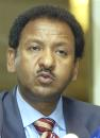Sudan’s FM hopes talks will bring ‘final’ peace to Darfur
By GILBERT DA COSTA, Associated Press Writer
 ABUJA, Nigeria, Aug 17, 2004 (AP) — Sudan’s foreign minister said Tuesday he hoped for “a final and justifiable peace” out of talks set here next week on his country’s troubled western region of Darfur.
ABUJA, Nigeria, Aug 17, 2004 (AP) — Sudan’s foreign minister said Tuesday he hoped for “a final and justifiable peace” out of talks set here next week on his country’s troubled western region of Darfur.
On a one-day visit to meet Nigerian President Olusegun Obasanjo, Sudanese Foreign Minister Mustafa Osman Ismail said his government would be “highly represented” at the talks, but would not say whether the country’s president, Omar el-Bashir, would attend.
Darfur has become the scene of the world’s worst humanitarian crisis, according to the United Nations, with 30,000 killed in fighting by some estimates and more than a million displaced. Around 2.2 million are in urgent need of aid, the United Nations says.
Pro-government Arab militia, known as the Janjaweed, are accused of waging a violent campaign of murder and rape to drive non-Arab African villagers out of Darfur since February 2003, when rebel groups rose up in Darfur.
The Sudanese government has been widely accused of backing the Janjaweed, which it denies.
Officials from the two rebel groups have also said they would send high-level delegations to the Aug. 23 peace talks in the Nigerian capital, Abuja, though they have not yet said who would be representing them.
Ismail said Obasanjo _ the current chair of the African Union _ has “a very important role to play in finding a political solution to the crisis.”
“The upcoming talks are very important,” he said. “If we can succeed on the political front it will reflect on the security situation.”
Nigeria is expected to send 150 troops to Darfur later this week, after the arrival of 150 Rwandan soldiers last week, to protect 80 African Union observers. Army spokesmen in Nigeria have so far given no date for their arrival in Sudan.
The African Union is considering beefing up its forces in Sudan to 1,800, beyond the 300 so far accepted by Sudan.
He rejected any idea that the African Union forces would act as peacekeepers, saying that “for now” they were going to protect the monitors.
“We will then continue to discuss and, by the end of the month, we will visit the area to see if the situation is getting better and what we should do.”
However, Rwandan President Paul Kagame has said that if his country’s troops saw civilians in danger, they would use force to protect them.
On July 30, the U.N. Security Council gave Sudan 30 days to quell ethnic violence in the vast western Darfur region or face economic or diplomatic penalties.
